STEM + Inquiry-based Learning
Turning kids into classroom explorers
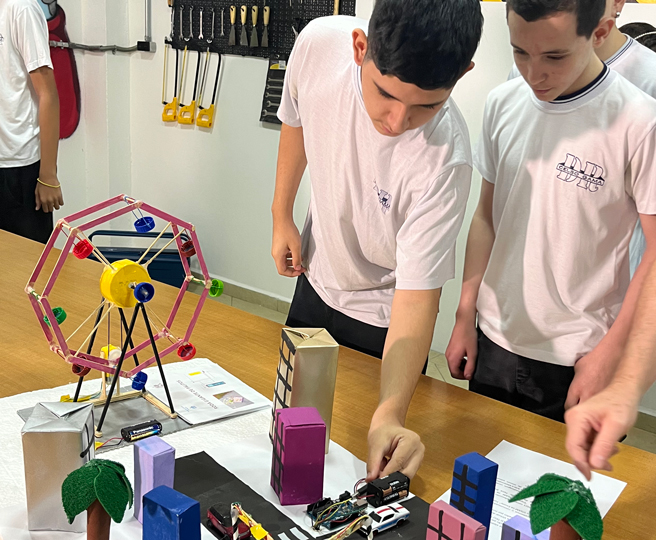
Climate change, energy transition, and an endless amount of new digital opportunities: understanding the fundamentals of science and technology is more important than ever for responsibly shaping our world – today and in the future. Success is dependent on finding the right approach: At school, it is far too common that facts are simply memorized rather than fully understood and applied. That’s why we are working with our partners to develop methodic approaches for STEM lessons that actively engage children and young people. The concept of inquiry-based learning is our guiding principle in these efforts.
DefinitionHow does inquiry-based learning work?
It is the desire to seek answers: “Where does electricity come from? How do I clean contaminated water? How is data transferred from one end of the world to the other?” When it comes to science and technology, children have an insatiable thirst for knowledge and boundless curiosity. Trying things out for themselves leads to new experiences, ideas, and conclusions. Educators are putting this to good use. With inquiry-based learning, children and young people learn to pose their own questions before applying different methods to find answers, reflect on the results, and process what it means to them as individuals (cf. Huber 2009 / Martius et al. 2016).
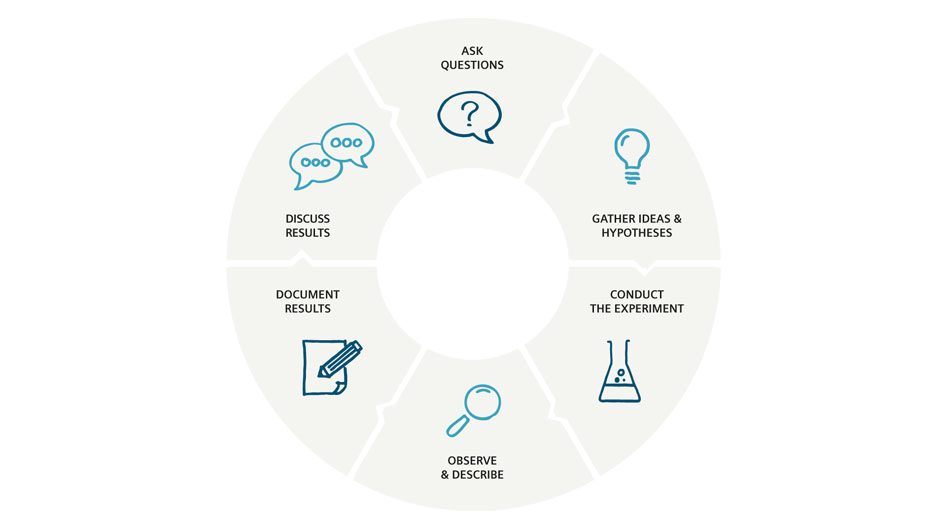
The research group names the stages of learning through discovery. Knowledge is actively acquired. Continuous monitoring is essential.
© Siemens Stiftung
MotivationImprove STEM lessons with inquiry-based Learning
We strongly believe that inquiry-based learning improves STEM lessons around the world and significantly increases interest and understanding of science and technology. Beyond that, inquiry-based learning encourages the application of knowledge, critical thinking, and new ideas – lessons that extend beyond the classroom. For Siemens Stiftung, there are three guiding principles in this regard:
Activity-based teaching – experimentation as a “formative experience”
The student is at the heart of inquiry-based learning. Each student’s actions and prior knowledge create a unique and personal approach to the material. For example, learning about electrical circuits is more than just memorizing the effects of various polarities, but also involves testing them out. This approach is based on the activity-based teaching method, in which experimentation is not a game or an end in itself. A balanced proportion of mental and motor stimulation creates a “formative experience” (cf. Jank/Meyer 2002 / Schratz i.a. 2012) in which children and young people understand and comprehend underlying phenomena.
Everyday issues – exploring a child’s real-life questions
Inquiry-based learning begins with questions that come from the everyday experiences of children and young people. Children are constantly observing the phenomena of their environment and everyday lives. They describe, compare, and interpret these experiences. This is where classroom lessons need to begin. The only way for a lesson to really stick is when a young learner can recognize the real-life relevance of a subject. More importantly, this connection is a motivator when it comes to exploring that subject further (cf. Anders et al. 2013 / Barron/Darling-Hammond 2010). Interdisciplinary thinking and activity become givens rather than exceptions.
Co-construction: learning together while strengthening social skills
Teachers and children shape the learning process together. They learn from and with each other co-constructively, without hesitation or fear of mistakes (cf. Fthenakis 2009). The emphasis is on honing skills, not simply acquiring static knowledge. Young learners discover that their own actions lead to success. It is a valuable, motivational lesson that boosts a child’s belief in his or her own capabilities. By discussing hypotheses in a group and searching for answers together, children learn communication and social skills at the same time.

«Experimentation without a clear, pedagogical concept is just a game. That’s why well-trained educators are so important.»
Dr. Barbara Filtzinger, Head of the Education Working Area and board member at Little Scientists Foundation
ServicesInquiry-based learning in our projects
The methodology of inquiry-based learning plays a central role in our programs and initiatives. For us, the focus is on education and training opportunities for science and technology educators. We emphasize a concept that promotes inquiry-based learning across all age groups and provides space to integrate international perspectives.
Our education program Experimento
The principle of inquiry-based learning forms the foundation for our international education program Experimento. Together with the foundation “Kinder forschen” (Little Scientists Foundation), the Associate Professorship of Life Sciences Education at TU Munich, the Faculty of Psychology and Education at Ludwig Maximilian University Munich, as well as the Didactics of Chemistry at Eberhard Karls University Tübingen, and experts from schools, we have developed training seminars and teaching materials that provide educators with the tools they need for experimenting in the classroom. Thematically, the lessons focus on energy, the environment, and health.
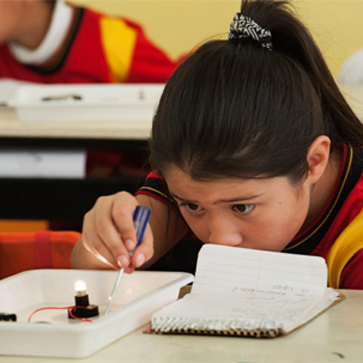
Our engagement on behalf of Little Scientists' House
In addition to our own operative work, we’ve joined the Helmholtz Association, Dietmar Hopp Stiftung, and Deutsche Telekom Stiftung in supporting the foundation “Kinder forschen”. At the foundation “Kinder forschen”, teachers, education experts, and nursery school administrators attend training seminars aimed at encouraging a child’s innate interest in learning and science with age-appropriate methods. The initiative is nation-wide in Germany, and more than 68,000 educators have taken part in the program.
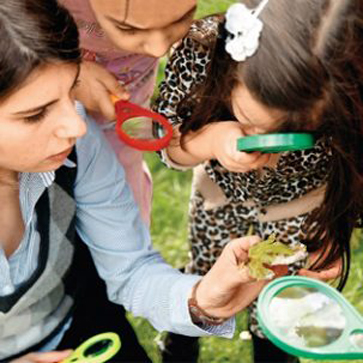
The international take on a didactic principle
The principle of inquiry-based learning is the same the world over, but classroom implementation varies greatly from country to country. Country-specific curricula and school policies have an important role to play here.
We provide ideas with our international education program Experimento, but implementation is different in every country. This is beneficial: Inquiry-based learning is adaptable to a wide range of new content and methods. We work with national education partners in twelve countries (Argentina, Bolivia, Brazil, Chile, Colombia, Kenya, Germany, Mexico, Nigeria, Peru, and South Africa ) to create new opportunities for sustainable STEM lessons.
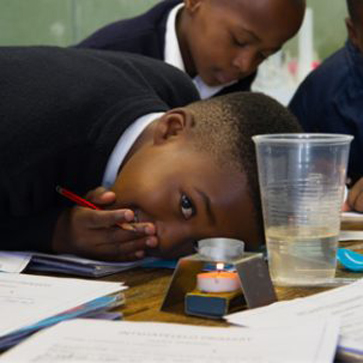
Would you like to learn more?
Websites
Sources
- Aepkers: Forschendes Lernen – Einem Begriff auf der Spur. In: Aepkers, M. / Liebig, S. (Hg.): Basiswissen Pädagogik. Unterrichtskonzepte und -techniken, Band 4. Baltmannsweiler (2002), S. 69-87.
- Anders, Y., Hardy, I., Pauen S., Steffensky, M.: Zieldimensionen früher naturwissenschaftlicher Bildung im Kita-Alter und ihre Messung. In: Stiftung Haus der kleinen Forscher [Hrsg.]: Wissenschaftliche Untersuchungen zur Arbeit der Stiftung „Haus der kleinen Forscher“, Band 5. Schaffhausen 2013, S. 19-81.


